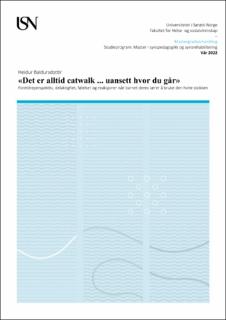| dc.contributor.advisor | Berndtsson, Inger | |
| dc.contributor.author | Baldursdottir, Heidur | |
| dc.date.accessioned | 2022-07-02T16:41:34Z | |
| dc.date.available | 2022-07-02T16:41:34Z | |
| dc.date.issued | 2022 | |
| dc.identifier | no.usn:wiseflow:6553402:49507046 | |
| dc.identifier.uri | https://hdl.handle.net/11250/3002341 | |
| dc.description.abstract | For mange mennesker med nedsatt syn eller blindhet er den hvite stokken en av de viktigste ressursene for å kunne leve et selvstendig liv, hvor de kan mobilisere og orientere seg i omgivelsene. Dette er ikke minst viktig for barn med alvorlig synshemming, som de første årene trenger å lære seg å bruke den hvite stokken samt spesielle teknikker, for etter hvert å kunne bevege seg og orientere seg selvstendig. Ofte når vi fagfolk snakker om barn og hvordan de lærer å bruke den hvite stokken, er fokus kun på barna selv. I barnets læringsprosess spiller imidlertid foreldre en stor rolle. Foreldrene må samarbeide med ulike fagpersoner og institusjoner, og i mange tilfeller er foreldre de viktigste lærerne i barnets liv.
Hovedspørsmålet som ble besvart: Hvordan opplever foreldrene sin rolle og følelser i barnets læreprosess av den hvite stokken? Dette spørsmålet ble delt inn i følgende delspørsmål: Hva føler foreldrene og hvilke er deres reaksjoner når barnet skal lære seg å bruke den hvite stokken? Hvordan beskriver foreldrene sin erfaring og sitt samarbeid med de fagpersonene som lærer barnet å bruke den hvite stokken? Hvordan opplever foreldrene sin delaktighet i opplæringen? Hvilke utfordringer i læringsprosessen opplever foreldrene?
Dette er en kvalitativ studie med semistrukturert intervjuteknikk. Totalt ble det gjennomført fire intervjuer via videosamtaler, med siv foreldre til fire barn i alderen to til ni år. Alle var født blinde og alle hadde begynt å lære å bruke stokken i tidlig alder. Intervjuene ble transkribert og analysert med kvalitativ innholdsanalyse.
Resultatene viser at alle foreldreparenes reaksjoner og følelser var positiv til den hvite stokken. Foreldrene opplevde den som et viktig hjelpemiddel og merka økt selvstendighet og selvtillit hos barna når de brukte den. Foreldrene opplevde sin erfaring og samarbeid med fagpersoner først og fremst som god. De opplevde seg delaktig i prosessen og hadde mye ansvar. Noen utfordringer med læringsprosessen var blant annet at foreldrene opplever for mye oppmerksomhet når de var ute og gikk med barna med den hvite stokken. Noen dager avsto de til og med fra å ta med den hvite stokken ut på tur med barnet fordi de ikke orket å få denne oppmerksomheten.
Konklusjonen er at det svært viktig at vi fagfolk fokuser ennå mer på foreldrene i fremtidige læringsprosesser, at vi skaper godt samarbeid og motiverer foreldrenes til å delaktighet i barnets læring. | |
| dc.description.abstract | For many people with impaired vision or blindness, the white cane is one of the most important resources for being able to live an independent life, where they can mobilize and orientate themselves in their surroundings. This is just as important for children with severe visual impairment, who in their first years need to learn to use the white cane as well as other special techniques in order to eventually be able to move and orient themselves independently. Often when we professionals talk about children and how they learn to use the white cane, the focus is only on the children themselves. However, in the child's learning process, the parents play a major role. Parents must work with different professionals and institutions, and often it is the parents that are the most important teachers in the child's life.
The goal of this study was to answer this one main question: How do the parents experience their role and feelings in the child's learning process of the white cane? This question was divided into the following sub-questions: How do the parents feel and what are their reactions when the child is to learn to use the white cane? How do the parents describe their experience and their collaboration with the professionals who teach the child to use the white cane? How do parents experience their participation in the education? What challenges do parents experience in the learning process?
This is a qualitative study with a semi-structured interview technique. A total of four interviews were conducted via video calls, with a total of seven parents of four children aged two to nine years. Every child was born blind, and the children had started learning to use the cane at an early age. The interviews were then transcribed and analyzed with a qualitative content analysis.
The results show that all the parents had positive reactions and feelings towards the white cane. The parents experienced it as an important aid and noticed increased independence and self-confidence in the children when they used it. The parents had mostly good and positive experience when collaborating with the special aid teachers or instructors. They felt they were involved in the process and had a lot of responsibility themselves. Some of the challenges with the learning process were, among other things, that the parents feel they drew too much attention when they were out walking with their children while they were using white cane. Some days they even refrained from the child using the white cane when out for a walk, because this attention was overwhelming and affected them in a negative way.
In conclusion it is very important that we as professionals in the future focus even more on the parents during the child's learning processes, that we enhance good cooperation and motivate the parents to participate in the child's learning in a positive way. | |
| dc.language | nob | |
| dc.publisher | University of South-Eastern Norway | |
| dc.title | «Det er alltid catwalk ... uansett hvor du går» Foreldreperspektiv, delaktighet, følelser og reaksjoner når barnet deres lærer å bruke den hvite stokken | |
| dc.type | Master thesis | |
